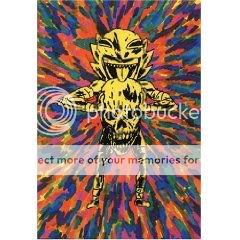Maggots
Brian Chippendale, writer/artist
PictureBox, 2007
344 pages
$21.95
Buy it from PictureBox, pretty cheap in fact
Here’s a hard one to wrap your head around. Maggots is a book that almost prides itself on its insular incomprehensibility. Originally and infamously drawn over the pages of a Japanese book catalog, its panels are meant to be read in a chutes-and-ladders zig-zag that skips, stutters, and shifts direction entirely the second you finally feel like you have a handle on it. In a sense, the first effect you get from reading the book is to learn how to read it. Slowly, your eyes become better at detecting characters’ changes in direction, their movements up or down, how they sit down or stand up or lie down, how they eat or fuck or simply walk up to one another. Eventually these clues enable you to read enough panels in the proper order–or at the very least get some kind of overall sense of what’s happening on a page–so that you can understand what’s going on.
So what’s going on? Well, that’d be kind of difficult to grok even if the book weren’t constructed like a clue someone found in the Orchid Station on Lost. Basically, a bunch of little munchkiny guys run around (literally, a lot of the time) behaving in ways that frequently lead to violent confrontation, whether that involves giants, or rabbits with samurai swords, or people stealing each other’s eyeballs, or the victims of eyeball theft coming back to exact their revenge. The “story” isn’t so much a plot as it is a sense of ever-present danger, the idea that the cute li’l business we’re seeing involving eating raisins and sticking the container somewhere hard for someone else to get to afterwards could at any moment give way to a legion of attacking mice, or some sort of death-mask-wearing sorcerer, or some genuinely unpleasant knifework.
The tension is maintained by Chippendale’s art, which feels like a peak into a hermetically sealed limbo of endless black, occasionally interrupted by secret trapdoors, ladders, and at least one food stand. Panels are tiny, cramped, filled in as much as they can be, careening wildly from one end of the page to the other. Even the white space is busy, showing the text of the catalog underneath. No matter how much our hero Hot Potato and his comrades and enemies run, jump, climb, crawl, and even fly, there doesn’t seem to be any way out for them. Of course, this makes the moments when Chippendale pulls back for a dazzling spread–a field of flowers, the arrival of that sorcerer guy, a massive staircase–all the more impressive. That’s the oldest trick in the book, but there’s a reason for that: It works.
And so, in its weird way, does Maggots. This isn’t going to be launching a Teenage Mutant Ninja Turtle-style wave of imitators anytime soon, even among the most Fort Thunder influenced cats around today–a 344-page experiment in graphic novel form? It’s a miracle this thing ever got published. And it’s certainly a challenging, at times frustrating read, with not a whole lot in terms of immediate satisfaction going for it. But once you get into that groove of letting your eyes weave back and forth across the pages, you just start appreciating the aesthetic qualities of the thing. Those chunky black panels. Chippendale’s Muybridge-like proficiency with breaking physical action down into its constituent beats. The character designs. The humor (“We have a no pants, no service policy.” “Do you have pants back there? I’ll take them.” “Sorry–no pants, no service”). The genuine, if raw, eroticism of all those bizarre sex scenes (I actually think this strange, avant garde comic captures the awkwardness and explosiveness of long-distance relationship reunions as well as any I’ve read). The random, astutely observed moments of quotidian business (there’s a great, two or three panel bit where Hot Potato scoops up a cat who was crawling around the sink that brought a smile of familiarity to my face). Even the sumptuous texture of the cover underneath the dust jacket. This is not a comic for everyone, duh, but if you’ve been interested in it in the past, I think you’ll find it interesting.
Tags: comics, comics reviews, Comics Time, reviews


Comics Time: Ninja
Ninja Brian Chippendale, writer/artist PictureBox, 2006 128 pages, hardcover $34.95 Buy it from PictureBox Buy it from Amazon.com Starting off a review of a Brian Chippendale comic by talking a plot seems like the laziest most wrongheaded way to…